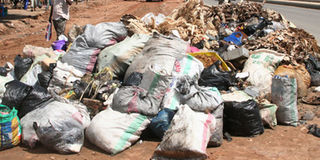THINKING ALOUD : Needed urgently: A rethink of Dar’s garbage problem

What you need to know:
- In the city one finds hundreds of small hotels and open-air eating places and these drain their dirty water onto pavements where it mixes with the sand outside, creating filth and stench.
When I walk on the streets of Dar es Salaam I see heaps of uncollected garbage, accumulation of dirty water and an unbearable stench and I ask myself: why shouldn’t there be no cholera? The city council is perhaps trying to do a good job of keeping the city clean, but to a visitor the city remains an eyesore.
In the city one finds hundreds of small hotels and open-air eating places and these drain their dirty water onto pavements where it mixes with the sand outside, creating filth and stench.
There is a need to do a better job and high on the agenda of the city fathers should be how to clean this city. Half-hearted attempts have not proved beneficial and there is a dire need to have the political will and strictly follow the existing laws. Appropriate resource inputs and involvement of professionals are also needed.
Dar, just like other cities in the developing world, has witnessed rapid unplanned urbanisation, and this has burdened the city with issues that can no longer be ignored, particularly how to keep it clean.
It is estimated that Dar residents generate about 5,000 tons of garbage each day, but the capacity to collect all this waste is lacking. There is no programme of educating the public about recycling or other waste reduction options. As a result, the city’s garbage simply piles up at numerous dumps, which attract flies, rats and other vermin. The dumps encourage poor people to scavenge amongst the trash to earn a meagre living. Some people even live on the dumps in shanties amid fetid garbage, methane fumes and various toxins.
The garbage collection problem in developing cities has found its way into the Sustainable Development Goals (SDGs), an important 15-year agenda of priorities to be addressed.
There is an urgent need to think out of the box and shed the business-as-usual attitude. A change in policy, practices and mindset is needed and we must adopt practices that have been successful elsewhere in cities that are similar to Dar es Salaam. The current practice of collect-and-dump is definitely not helping to keep the city clean.
We know that we have a serious garbage problem, but the problem is not about finding the right technology for waste disposal but how to integrate the technology with a system of household-level segregation so that waste does not end up in landfills and is processed and reused. It is clear that there will be no value from waste, as energy or material, if it is not segregated, but this is where our waste management system falls short. It is the responsibility of the city council to ensure that segregation of waste takes place at the source. This means to segregate waste at the household level and then ensure that this segregated waste: wet and dry, compostable and recyclable: is collected separately and transported separately for processing.
The easier solution is to collect and dump which has its challenges, or to believe that unsegregated waste can be sorted out mechanically at the processing plant itself and burnt, this is not the magic bullet: collect, sort and burn. But as experience from the rest of the world shows, if waste is not segregated then it will make poor quality fuel. This will not work.
Segregation at source should therefore be made the new policy of solid waste management system. I saw this system practiced in Panaji, India. Municipal officials have ensured a citywide system that is designed to collect household waste on different days for different waste streams. This ensures separation. It is combined with penalties for non-segregated waste and has promoted area-level processing as well. Most importantly, for the bulk of commercial establishments such as hotels it has a bag-marking system so that any non-compliance can be caught and fined.
But this is one part of the waste solution. The other is to make sure there is no place for the unsegregated waste to go. This means taking tough steps to manage landfills in the city and only be used for residual waste that is non-usable, non-recyclable, non-biodegradable, non-combustible and non-reactive.
We need to turn the system of garbage management on its head. Only then will we really clean our cities instead of sweeping the dirt under the carpet.
There is a need for more community empowerment, ownership and decision-making. Each area or community should be involved to ensure household segregation of garbage, collection and transporting it to the allocated places for composite and recycling, this will ensure some job creation and perhaps reduce corrupt practices when there is central tendering for collection and transportation.
It can be done, but someone has to take the lead.
Zulfiqarali Premji is a retired Muhimbili University of Health and Allied Sciences (Muhas) professor currently living in Canada




